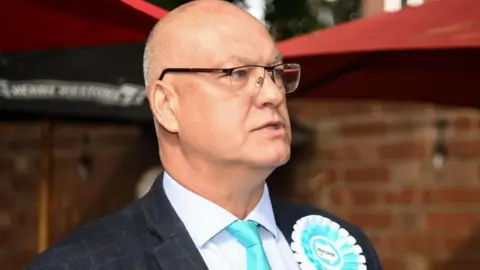The political landscape within local governance is often marked by challenges and debates, particularly when new parties, such as Reform UK, gain power. Recently, Ian Cooper, the leader of Staffordshire County Council, faced scrutiny regarding his party’s competency in managing local authorities after winning a decisive victory in the May local elections. While Cooper’s administration seeks to redefine its image and establish credibility, critics from the Conservative opposition claim that the new leadership has performed poorly in its initial 100 days.
Cooper’s ascension to leadership occurs amidst noteworthy transition, as Reform UK succeeded the Conservative party in Staffordshire County Council, capturing a staggering 49 out of 62 seats with 41% of the vote. The transformation of government is fraught with expectations, particularly for a nascent party like Reform UK, which aims not only to govern effectively but also to alter public perception of its capabilities. Cooper acknowledges the uphill battle, stating, “We have to prove to people we are competent.” His commitment to changing the image of the party comes in response to feedback from constituents, who have expressed skepticism regarding the party’s capacity to manage local affairs.
One of the most pronounced criticisms has come from Councillor Phillip White, the leader of the Conservative opposition, who accused Reform of having a lackluster start characterized as a “do-nothing council.” This assertion resonates in the community, with rumors circulating about whether the council has been making meaningful progress. White pointedly remarked, “Some people have been calling Staffordshire County Council a ‘do-nothing council’ over the last few months,” indicating that residents are becoming increasingly impatient for tangible outcomes.
Since taking office, Reform UK has implemented specific decisions that were aimed at demonstrating its commitment to governance. These decisions include halting non-essential roadworks in areas such as Stafford and reassessing spending priorities, such as not investing the allocated £4.5 million in electric vehicle charging infrastructure. Additionally, the council announced an expenditure of nearly £14,000 for a new position focused on enhancing special needs education in the county. These moves reflect an attempt to prioritize fiscal responsibility while addressing pressing community needs.
Cooper defended his administration’s efforts, emphasizing that success is not always immediately visible but is rooted in ongoing projects and the alignment of financial resources to meet emerging goals. Nevertheless, he did not disclose specifics about the future initiatives that lie ahead, opting instead to maintain an air of anticipation regarding what the Reform UK leadership might accomplish moving forward.
The initial 100 days were also marred by controversy surrounding an unexpected by-election, which cost the council an estimated £27,000 due to the resignation of Councillor Wayne Titley shortly after his election. In a by-election held on July 17, the Conservatives secured the seat, reflecting mounting public dissatisfaction with Reform UK’s performance. Cooper has previously indicated a reluctance to heed critiques from other parties, citing the necessity to carve a distinct path for the council and proving its worth to constituents.
As the upcoming council meeting in October approaches, the pressure on Cooper’s leadership intensifies. Questions remain whether he can not only ensure effective governance but also alter the critique of the council’s efficiency. With these challenges in mind, the communities served by Staffordshire County Council will be keenly observing the unfolding political dynamics to see if the Reform UK-led administration can translate its aspirations into substantive policy achievements.
In summary, reforming public perception in local government is a formidable task, especially for an emerging political entity like Reform UK. Thus far, their journey under the stewardship of Ian Cooper is met with a mix of cautious optimism and stark skepticism, with significant opportunities for growth tempered by a pressing demand for accountability and effective action.











